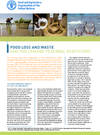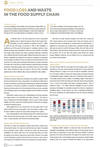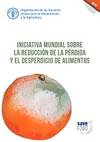This brief highlights the environmental impacts of food loss and waste, the collective efforts to reduce food loss and waste and presents key considerations and recommendations.
Reducing loss and waste throughout the food supply chain should be considered an effective solution to reduce the environmental impacts of agriculture, to improve the income and livelihood of the chain actors and to improve food and nutrition security for low-income consumers. An increasing urban population, changing food consumption pattern and trade globalization have rendered food supply chains extremely complex and lengthy, which calls for a change of mind-set from the traditional way of addressing the causes of food loss at each stage of the food supply chain to an integrated approach. Investing in efficient, low-cost and sustainable processing technologies, adequate storage and packaging solutions, road infrastructure and market linkages as well as providing training and education to chain actors, including consumers, are among the tried and proven interventions which increase the efficiency of the chain and therefore lead to a reduction in food loss and waste.
La Comunidad de Práctica en reducción de las pérdidas de alimentos sirve como coordinador e integrador de conocimientos relacionados con la reducción de las pérdidas poscosecha. Ofrece una plataforma para facilitar el intercambio de información entre las partes interesadas y las redes, proyectos y programas relevantes. La página web de la CdP incluye información general, noticias, eventos, debates en línea, recursos y enlaces de los socios. Las partes interesadas participen en una movilización mundial para ayudar a reducir las pérdidas y el desperdicio de alimentos. Los miembros registrados pasan a ser miembros de SAVE FOOD: Iniciativa mundial sobre la pérdida y el desperdicio de alimentos.
The report begins by reviewing the evidence to date focussing on the magnitude and geographical distribution of food losses. In the next sections the role of energy in post-harvest losses is discussed. Thereafter, the main entry points within the food value chain where lack of access to energy is the dominant factor influencing food losses is discussed. This report outlines low cost and off-grid post-harvest cooling and processing technologies that can be made available in developing countries. These household to community scale evaporative cooling systems, solar assisted cooling systems and as well as solar drying systems that can help increase shelf life. Additionally, through case studies, focus is laid on assessing the technical and economic feasibility of cooling and processing technologies. Finally, recommendations are made that could be incorporated to further develop food loss strategies that can classify food value chains based on their energy demand. This will enable policy makers to quickly understand the main technologies for food preservation and processing that can be introduced based on the available energy sources in a given region.
A focus on food prices and price transmission effects.
Jointly drafted by FAO and LEI Wageningen UR, this paper uses scenario analyses to investigate how reductions in food loss and waste (FLW) in the European Union (EU) could influence prices in sub-Saharan Africa [...]
Hace tiempo que la FAO ha reconocido la importancia de una acción concertada para la reducción de las pérdidas de alimentos [...]






